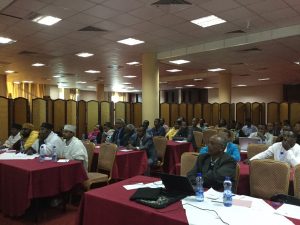The Ethiopian Graduate School of Theology (EGST) in collaboration with the Norwegian Church Aid (NCA), Ethiopian Orthodox Tewahedo Church (EOTC) and other theological institutions conducted an ecumenical research dissemination workshop on November 23, 2017 at Friendship International Hotel, Addis Ababa. The workshop is the second in its type in a series of ecumenical research dissemination efforts organized by EGST, NCA and other institutions since 2016.
Four research papers were presented and discussed in the workshop by scholars from Stellenbosch University, Ethiopian Graduate School of Theology (EGST), Association of Evangelical Theological Institutions in Ethiopia (AETIE), and the Ethiopian Orthodox Tewahedo Church (EOTC). Participants came from Sewasew Brehan St. Paul EOTC College, Holy Trinity EOTC College, Debre Brehan EOTC Clergy Training Center, Ethiopian Catholic Church, Pentecostal Theological College, Meserte Kirstos College, EOTC DIACAC, EECMY DASSC, Emmanuel Fellowship Church, West Gojam EOTC Diocese, and other institutions.
Welcoming the participants to the workshop, Mrs. Bizuhayhu, NCA Senior RH Officer, remarked that NCA has existed for more than 40 years in Ethiopia and is currently working with faith communities and ecumenical bodies on gender, reproductive health and related issues. She further said that the dissemination of research papers from theological institutions since 2016 is facilitating discussions, debate and recommendations which will continue today and in the future.
Introducing the workshop purpose to the participants, Mr. Addise Amado, Head of EGST Development and Communications, pointed out the importance of sharing and learning in such forums and the dissemination of research findings from the ecumenical colleges and related institutions. He further confirmed the commitment of EGST in collaborating with theological colleges and likeminded organizations like NCA in an ecumenical spirit.
The first research paper focusing on ‘The role of Wolayita Kale Heywet Church in Ending Female Genital Mutilation/Cutting /FGM/C’ was presented by Tihitina Telemos from Stellenbosch University, South Africa. The research has recommended the church to play its leadership role in its development work, in rehabilitating and restoring women who underwent FGM, and the need for women ministry to work hard to flourish the lives of women through gender capacity building and mainstreaming.
The second paper by Kidist Bahiru from EGST concentrated on ‘the Ethiopic Reception of Genesis 3:16 in selected Ethiopic Texts’. This research which focuses on marital relations between husband and wife by analyzing different Ethiopic translations and commentaries on the text was appreciated by EOTC and other participants.
‘Baseline Survey on the Role of Evangelical Theological Institutions in the Abandonment of Harmful Traditional Practices /Female Gentile Mutilation (HTPs/FGM)’, the third research paper for the workshop was presented by Daniel Yilma from (AETIE). This research concluded the findings on the role of theological colleges based on information generated from eight AETIE member colleges. The paper indicated that the eight AETIE member colleges did not address HTP/FGM issues in their curricula, research and community engagement directly due to lack of contextual curriculum, absence of scholars on the issues and related challenges despite the willingness and openness of the institutions towards the issue.
The recommendations proposed for awareness creation of the colleges, encourage research efforts, create common discussion forums and support colleges to review their curriculum to contextualize social issues. Concerns raised include lack of curriculum, teaching materials, and the temporary nature of the issues among other things.
The fourth study entitled ‘The Contribution of the EOTC in Preventing the Impact of Early Marriage: the Case of Jabi Tehnan Woreda’ in West Gojam Zone, is presented by Teacher Temesgen Tsegayehu. The research findings indicated that people practice early marriage to get pleasure in wedding, to see grandchildren quickly, and to bring wedding gifts and economic and social return to the family. According to the study, the negative consequences include health and socioeconomic consequences, as well as loss of ordination in the church. The contributions of the EOTC is mentioned as condemning the practice, teaching the community, training clergy and collaborating with other organizations such as Population Council in fighting the harmful practice.
Recommendations forecasted celebrating marriage at the right time with the right couples, the need to promote mutual understanding with proper preparations, awaking the laity and clergy on the negative consequences of early marriage and restore those already affected.
On the way forward to the future, the workshop participants discussed and recommended that such workshops to be strengthened and sustained by joint effort and by ensuring quality of the research findings. The organizers are tasked to work on the recommendations of the workshop and disseminate action plan for further follow-up.
In his closing remark to the workshop, Abba Elias from the Sewasew Brehan St Paul College said that “we are citizens of the same country having common problems to be addressed in unison. Let us continue coming together and deliberate on issues of our communities”. He further extended gratitude to the organizers, research presenters and the participants. [EGST PR].

